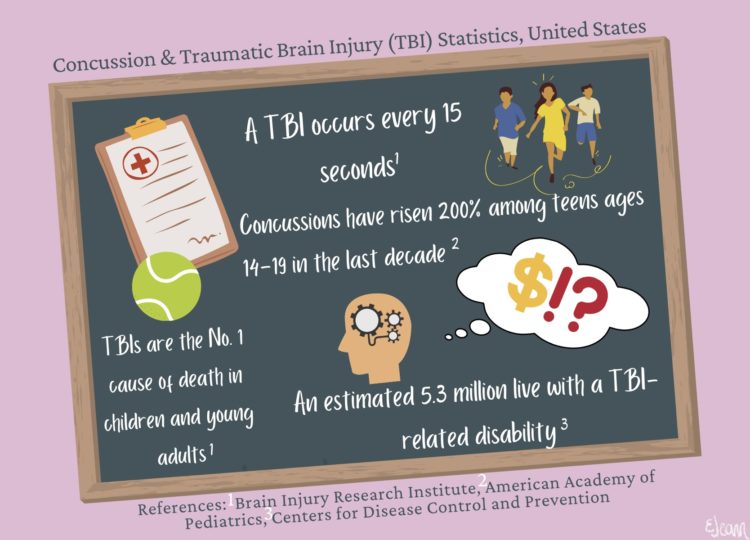What I've Learned After Experiencing Post-Concussion Syndrome
1. A concussion is a traumatic brain injury
The Centers for Disease Control and Prevention (CDC) describes a traumatic brain injury (TBI) as an injury caused by a a bump, blow or jolt to the head, that disrupts the brain’s ability to function normally. To get down to the nitty gritty, brain injuries occur when your brain passes its comfy cushion of cerebrospinalfluid and hits your skull. TBIs are put into the categories of “severe,” “moderate” and “mild.” Severe TBIs sometimes result in brain swelling, bleeding and/or blood clots, while the results of mild TBIs often occur on a cellular level and do not show up on CT scans or MRIs. Concussions are mild TBIs.
2. Your first concussion might not be your first concussion
Concussions often go undiagnosed, meaning an ER doctor or general practitioner (GP) never tells you, “you have a concussion,” or are self-diagnosed, meaning you say to yourself, “I think have a concussion.” Both of these scenarios result in your precious noggin not getting the attention it probably needs. Think about how many times you’ve knocked your head in your life, whether it’s on a car door, cabinet or from a fall or sports-related injury. Your head immediately hurts and maybe the hit causes a headache for a couple days, but life is busy and soon you forget it ever happened. One of those times might have been a concussion. Subsequent concussions can take longer to recover from and cause more symptoms. Originally, I thought the tennis ball to the head was my first concussion, but in looking back it was probably my third or fourth.
3. It’s impossible to predict the rate and longevity of recovery
Everyone’s body reacts differently to head trauma. Some people have brain injuries from car accidents and recover in a matter of months, while other people (me), get hit with a ball and take four plus years to recover. According to PubMed, people recover within seven to 10 days in most cases, but others take longer. None of my healthcare professionals ever professed to know when I would be “better” and most put the probable answer in the medical mysteries category.
4. Post-concussion syndrome is a thing
Post-concussion syndrome is a condition affecting 15 to 20 percent of people who experience concussion in which the symptoms of the initial concussion last more than three months. These symptoms include but are not limited to: headaches, dizziness, vertigo, anxiety/depression or other mood changes, fatigue, insomnia, light and noise sensitivity, loss of concentration and/or memory and blurry vision or other vision problems. I was diagnosed with post-concussion early on, but still consider myself to have it now.

5. Medical professionals still don’t know a whole lot about treating concussions
Because the number of reported concussions in children and young adults has been steadily increasing over the last 10 years, research in the area has increased as well. While more research is fantastic, it doesn’t necessarily help those who are struggling now. If your concussion symptoms last for more than a week, your GP will probably refer you to a neurologist or a concussion clinic. The problem with seeing a neurologist is the field is so broad. Neurology covers all disorders affecting the brain and nervous system including Alzheimer’s, amyotrophic lateral sclerosis (ALS), dementia, Parkinson’s, epilepsy and migraines, with concussions thrown in there. Chances are the neurologist in your area/insurance plan didn’t invest time in concussion recovery. The problem with concussion clinics is they usually offer one-size-fits-all programs run by doctors who studied either family or internal medicine (giving them the same qualifications and knowledge as your GP) or sports medicine. Unfortunately, these three field are also super broad.
My experience for the most part has consisted of being treated for what my neurology office considered as “migraines.” A physician’s assistant, after not examining my head or spine, would write me scripts for the latest pills, injections or not-covered-by-my-insurance medical devices. It took me three years to find healthcare professionals who specialized in brain injury recovery or knew enough about concussions to tackle the root problems instead of the symptoms.
OK, that’s five! If you’ve made it this far thanks for sticking with me. My intention is always to encourage, support and educate, and never to scare or burden. Feel free to comment below or send me a message if you have any questions or concerns!
Getty image by Maria Voronovich

